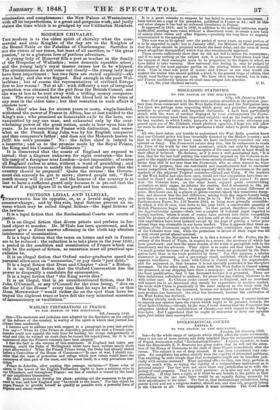WARLIKE PREPARATIONS IN FRANCE.
TO THE EDITOR OF THE SPECTATOR.
6th January 1848.
Snt—The moderate and judicious tone adopted by the Spectator on the subject of the defence of the country, is worthy of the spirit in which that journal has always been conducted.
I venture now to address you with respect to a paragraph in your last article. You say—" When he (the Prince de Joinville) pointed out that a French com- mander could now appoint the very hour for landing his troops independently of wind and tide, he warned us more than he roused his countrymen, for it is not Understood that the Prince's counsels have been adopted." I fear the fact is the reverse of this statement- If England had taken any warning, could the Duke of Wellington's letter have been written nearly three years afterwards? When the French Prince wrote, the Duke had already stated before a Committee of the House of Commons— In case of war, I should con- sider that the want of protection and refuge which now exists would leave the commerce of that part of the coast, and the coast itself; in a very precarious con- dition."
Prince de Joinville, after quoting this passage exclaims—" These cries of alarm in the bosom of the English Parliament ought to have a salutary echo in our Chambers, and throughout France: our line conduct is traced by the hand of our neighbours themselves." He then proceeds to develop his plans; pointing out the measures to be pur- sued in war, and how England may "be struck to the heart." For this object he 'Lieges France to provide herself as quickly as possible with a powerful force of frigates and steam-vessels.
It is a great mistake to suppose he has failed to arouse his countrymen. I have before me a copy of his pamphlet, published in France at 4<1.; and in this and other shapes it has had an universal circulation in France.
It appeared in 1844; and in 1846, in addition to the ordinary estimates, nearly 4,000,000I. sterling were voted without a dissentient voice, to create a new force of ninety-three steam and other frigates,—precisely the very force so urgently recommended in the pamphlet.
This vote was to be spread over the period of seven years au equal portion of it to be expended in each; but in January 1847, the Minister of Marine proposed that the ships should be prepared without the least delay, and the term of seven years altogether disregarded; which was also unanimously approved. These events sufficiently show that he did not fail to arouse his countrymen; and if we hear nothing on the subject now, it is because Frenchmen know that the success of their onslaught must be in proportion to the degree in which we have failed to take warning. How universal this feeling is, may be judged by the silence of the most opposite parties on the stirring letters we have recently read. This is their sole point of union; and France as one man would rise against the traitor who should publish a word, in the present stage of affairs, that might tend further to open our eyes. We have often been warned, but in vain; and France confidently believes we shall soon relapse into slumber.


























 Previous page
Previous page